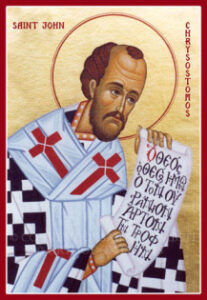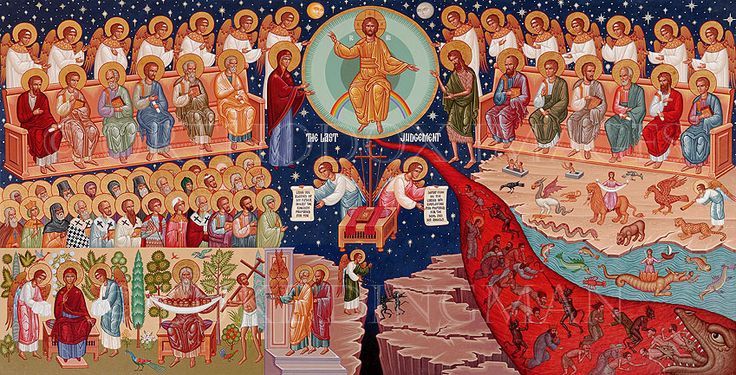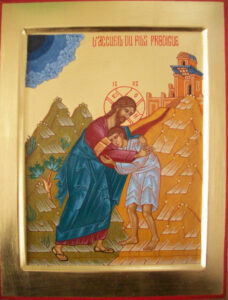Every year in preparation for Lent the Orthodox Church celebrates the Sunday of the Last Judgment. On this Sunday we hear the Parable of the Sheep and Goats (Matthew 25:31-46). It is sobering to be reminded that we will all one day appear before the Great Judgment Seat of Christ.
When the thrones are set up and the books are opened, and God sits in judgment, O what fear there will be then! When the angels stand trembling in Thy presence and the river of fire flows before Thee, what shall we do then, guilty of many sins? When we hear Him call the blessed of His Father into the Kingdom, but send the sinners to their punishment, who shall endure His fearful condemnation? But, Saviour who alone lovest mankind, King of the ages, before the end comes turn me back through repentance have mercy on me. (Saturday Vespers for the Sunday of the Last Judgment, p. 151)
The Orthodox approach to eschatology is radically different from that of popular Evangelicalism. In my early days as an Evangelical I devoured books on the end times. I learned about the Rapture, the Great Tribulation, the Anti-Christ, the return of Israel and the rebuilding of the Jewish Temple. But for all the reading I had done, I did not learn much about the Great Judgment Seat of Christ. This neglect makes sense in light of the Evangelical understanding that when one accepts Jesus into your life all sins are forgiven and you are guaranteed a place in heaven. But this neglect has consequences for the Evangelical understanding of Christian discipleship.
As I look back on my time as a Protestant Evangelical I am struck by the parts of the Bible that were quite often passed over. Paul writes in 2 Corinthians:
So we make it our goal to please him, whether we are at home in the body or away from it For we must all appear before the judgment seat of Christ, that each one may receive what is due him for the things done while in the body, whether good or bad. (2 Corinthians 5:9-10; NIV, emphasis added)
The “we all” in verse 10 refers to Paul’s Christian readers. Applied to today’s Christians this passage means that even Evangelicals must appear before the judgment seat of Christ. Born again Evangelicals are not exempt from the Judgment Seat of Christ. Pastors do their parishioners harm if they do not remind them of the final judgment that comes to all mankind including Christians.
The theme of the final judgment can be found in Evangelicals’ favorite book, Romans.
. . . the day of God’s wrath, when his righteous judgment will be revealed. God “will give to each person what he has done.” To those who by persistence in doing good seek glory, honor and immortality, he will give eternal life. But for those who are self-seeking and who reject the truth and follow evil, there will be wrath and anger. (Romans 2:6-8; NIV, emphases added)
The phrase “to each person” is all inclusive encompassing both believers and non-believers. The crux here is on the kind of life one lives – to those who persist in doing good and who seek glory, honor, and immortality God “will give eternal life.” There is no mention of eternal life depending on making a onetime decision for Christ. Therefore, any pastor who teaches a one-time decision and neglects to teach the Christian life as one of ongoing faith in Christ, good works, and perseverance is selling his congregation a bill of goods.
There are Reformed and Evangelical Pastors who do preach and teach on the perseverance in the faith, a life of good works, and holy living. The problem is that there is seldom if ever a sense of urgency and necessity for this for eternal salvation. It is most often trumped by teaching on “assurance of salvation” given a one time acceptance of Christ. So millions feel eternally secure, having punched their ticket to heaven, regardless how little holy and righteous living they might pursue in this life.
 Many pastors preach: once saved, always saved. It makes one think of the Monopoly board game “Get out of jail free” card. But is salvation in Christ all that easy? Or is salvation more profound, more costly, and therefore priceless? What is badly needed today is a pastor who tell the whole truth like it is.
Many pastors preach: once saved, always saved. It makes one think of the Monopoly board game “Get out of jail free” card. But is salvation in Christ all that easy? Or is salvation more profound, more costly, and therefore priceless? What is badly needed today is a pastor who tell the whole truth like it is.
 We find this straightforward bluntness in John Golden Mouth (Chrysostom), the famous fourth century church father. He took as his text 1 Corinthians 3:12-15 to warn his listeners against failing to meet the test on the Day of Judgment. The Scripture text reads:
We find this straightforward bluntness in John Golden Mouth (Chrysostom), the famous fourth century church father. He took as his text 1 Corinthians 3:12-15 to warn his listeners against failing to meet the test on the Day of Judgment. The Scripture text reads:
If any man builds on this foundation using gold, silver, costly stones, wood, hay or straw, his work will be shown for what it is, because the Day will bring it to light. It will be revealed with fire, and the fire will test the quality of each man’s work. If what he has built survives, he will receive his reward. If it is burned up, he will suffer loss; he himself will be saved, but only as one escaping through the flames. (1 Corinthians 3:12-15; NIV, emphasis added)
John Chrysostom opens up telling his listeners the need for straight talk about whether or not hell is eternal. He tells his listeners: “ordained as we have been to the ministry of the word, we must give pain to our hearers, not willingly but on compulsion.” In his exposition of 1 Corinthians 3:12-15 he equates the “foundation” with Christ and the “building” with our actions. The Christian life is more than just believing, it is also about living out faith in Christ through good works. If one does not live the faith, the consequences are dire. John Golden Mouth warns:
Now his meaning is this: If any man have an ill life with a right faith, his faith shall not shelter him from punishment, his work being burnt up. (NPNF Series 1, vol. XII p. 53; emphasis added)
Being Orthodox is no guarantee of “going to heaven.” One can be Orthodox – have “right faith” — but if one lives in unrepentant disobedience divine judgment can be expected. Among the Orthodox a different superstition seems to prevail; the thinking that a life of careless neglect of holy living, confession, fasting, and deeds of charity can easily be trumped by simply showing up occasionally just before the Holy Eucharist, receiving the Holy Mysteries, then leaving! This is dangerous to the soul and must be called out!
Orthodoxy understands Christian discipleship, not as a onetime conversion experience, but as a continual, ongoing conversion. Being a Christian begins with an initial act of trusting in Christ that is continually reaffirmed on a daily basis until the day we die. The Christian life is also one of spiritual warfare in which we do battle against the passions of the flesh and draw near to God in prayer. Orthodox discipleship is an invitation to a transformed life, that is, to sainthood. The name for this transformation is theosis.
The intersecting of Discipleship with Eschatology
Orthodox spirituality is about preparing for the Final Judgment. Every Sunday in the Liturgy the Orthodox pray:
For a Christian end to our lives free of shame and suffering, and a good defense before the dread judgment seat of Christ, let us ask.
How does one prepare for the coming encounter with Christ? The answer is found in the preceding petition:
That we may live out our lives in peace and repentance, let us ask of the Lord.
Orthodoxy views the Christian life as an ongoing returning back to God.
Orthodox Christians see ourselves as living in exile away from God because of our sins and making our way back home by journeying on the road of repentance. There is a song “Open for me the Gates of Repentance” that captures well the sense of penitence and trust that underlies the Orthodox approach to Great Lent. [Click here to listen to the chant.]
- Open to me the gates of repentance, O Giver of Life,
- For my spirit rises early to pray towards thy holy temple.
- Bearing the temple of my body all defiled;
- But in Thy compassion, purify me by the loving kindness of Thy mercy.
- Lead me on the paths of salvation, O Mother of God,
- For I have profaned my soul with shameful sins,
- and have wasted my life in laziness.
- But by your intercessions, deliver me from all impurity.
- When I think of the many evil things I have done, wretch that I am,
- I tremble at the fearful day of judgement.
- But trusting in Thy living kindness, like David I cry to Thee:
- Have mercy on me, O God, according to Thy great mercy.
Source
Lent is not about being threatened with divine wrath but an invitation to return home from exile. In Orthodoxy discipleship is an invitation to sainthood. Being a Christian is about being united with Christ and being transformed into his likeness. Through repentance, confession, and the spiritual disciplines of the Church the Holy Spirit works in us, restoring the image of God. Through fasting and prayers of repentance we undergo inner cleansing and renewal. For this reason, Lent is often referred to as the season of “joyful sorrow.”
Lord, Lord, at the Last Day shut not Thy door against me; but open it to me, for I repent before Thee.
Give ear to the groaning of my soul, and accept the tears that fall from mine eyes; O Lord, save me.
O Lover of mankind, who desirest that all men shall be saved, in Thy goodness call me back and accept me in repentance.
(Canticle Two, Wednesday in the first week of Lent, p. 238)


Robert,
What would the Orthodox response be to one who lives in fear that they will not be worthy at the last judgment? Is there any confidence that can be given to those who live in fear? Is there any assurance that we will obtain what we hope for?
Prometheus
Prometheus,
Thank you for your excellent question.
There’s a healthy fear and there’s an unhealthy fear. It sounds like you are describing the unhealthy kind. If you think someone (presumably an Orthodox Christian) has an unhealthy fear, express to them your concern and encourage them to talk with their parish priest or their spiritual father.
The Orthodox attitude is that we are sinners unworthy of God’s kingdom but that thanks to God’s mercy and love we been received into the kingdom of God. One red flag is the attitude “I have made it”; we can have made some amount of progress spiritually but we still have a long way to go. Confidence in God’s unfailing love is a hallmark of healthy spirituality.
Lent is a good time to go to confession. The priest or spiritual father can help you or the person you have in mind discern whether or not the fear is an unhealthy one or a healthy one.
Robert
Wow, great response to the question Robert.
People in late medieval Western Europe became obsessed with their personal salvation via the judgement seat of Christ. Sola Fides was an attempt to answer that question.
All they needed was some perspective and spiritual sobriety.
Isn’t personal salvation via the judgment seat of Christ important?
Robert,
I liked what you said: “Confidence in God’s unfailing love is a hallmark of healthy spirituality.” This is what reformation/protestant Christians are trying to say. Yet I think that what can be lacking is what you mentioned . . . a healthy fear; an avoidance of presumption while also avoiding despair (to use Catholic terms). Most Protestants I think believe in something like this as well, but they tend towards the explanation for presumption that someone “was never really saved in the first place.” This definitely is a weakness of much of the reformation legacy. Anyway, you have given me food for thought.
Robert, your good article has placed the emphasis where it needs to be placed. Evangelicals and Pentecostals take too much for granted when they ignore their sins and their need for sanctification and speculate on the timing of the second coming of Christ.
Having said that, may I ask what the Orthodox teaching is regarding the rapture? What about the millennial reign of Christ?
Thanks Chip. Good question about the Rapture and the millennial reign of Christ. That would make for an interesting article I’m sure many would want to read.
Robert
Good job Robert. Fr. Josiah makes a related point in his outstanding book Rock and Sand, that salvation by far more often spoken of as in the future in Holy Scripture. If Protestants are to be more “biblical” in their doctrine of salvation by being less obsessed about the past, than as the bible directs us toward the future.
http://www.amazon.com/Rock-Sand-Archpriest-Josiah-Trenham/dp/1939028361/ref=sr_1_1?ie=UTF8&qid=1457958802&sr=8-1&keywords=Rock+and+Sand
Thanks David for the book recommendation.
Robert
Wonderful article, Robert! Thanks.
What I love about Orthodoxy and its hermeneutic of the Scriptures in the Liturgy is how well it conforms to my actual concrete experience and intuitions as I sincerely seek to put the commandments of Christ into practice (not to mention how it gives expression in its prayers and hymnody to the yearnings of my heart). It doesn’t attempt to substitute abstract argument and faith in logical propositions about the meaning of Scripture (theological “systems”) for Christ Himself, but everywhere demands that I attend to the inherent tensions in all of Christ’s teachings that bring me face to face with Christ Himself and compel me to work out my salvation with fear and trembling, while at the same time continuously thrusting me back fully upon the mercy of God shown in Christ and not on my own human spiritual performance, will and strength.
Thanks Karen. I love your beautiful description of the tension in Orthodox discipleship. Looking back on my time as an Evangelical I wonder what the debates over pre- versus post-tribulation Rapture had to do with being a better disciple of Christ. That’s what I love about the balanced approach of Orthodoxy. It majors in the major topics and minors in the minor topics. Sometimes I think Evangelicals majored in the minor things when it came to eschatology.
Robert
Karen, I feel like you have struck the right note here on what exactly the balance should be between presumption and despair.
Prometheus
I recently studied the Book of Revelation in a group called Bible Study Fellowship with a group of Protestant women who did not believe that they will appear before the judgment seat of Christ and believed that they will be raptured before the Tribulation.
I shared that I also believed as they do, but after studying theology for 5 years at Wheaton College and Loyola, I discovered the views believed by the early church rather than what I heard on Moody Radio for the last 20 years. During my study, I gave an Orthodox perspective of doing a life of good works, not to earn our salvation, but as a way to give examples of the gratitude that we have Christ in our life, the reason we are called “Christians.” The women in my group were turned off by the looks I received at each study. Therefore, I decided to write my own Bible study of the Book of Revelation from an Orthodox Perspective and hopefully it may change some misconceptions.
You make a good comparison in your sentence, “Many pastors preach: once saved, always saved” is like a game. Bishop Kallistos Ware gave a lecture at Wheaton college and spoke so eloquently of how Orthodox believers are continually being saved and do not believe in the “once saved always saved” theory.
I enjoyed your blog! keep up the good work!